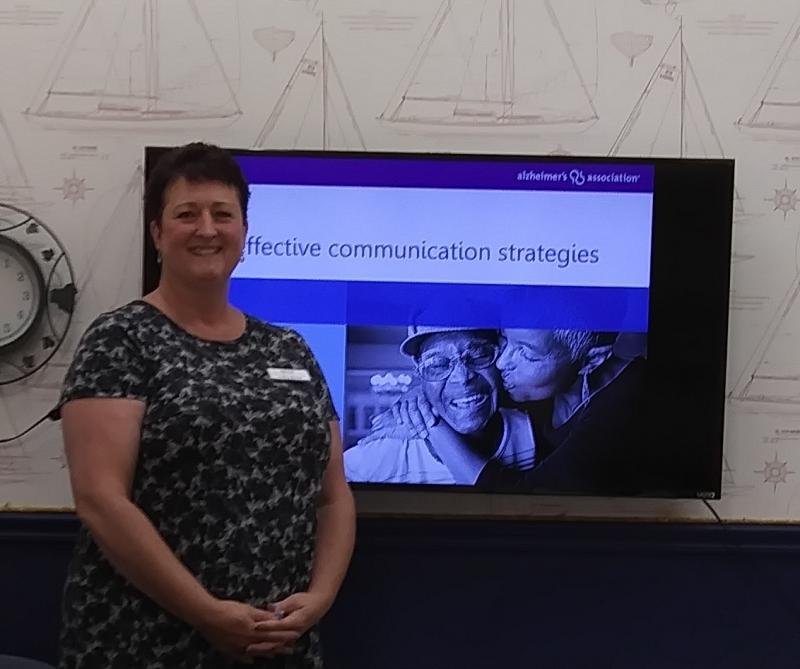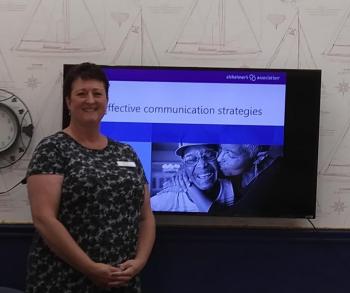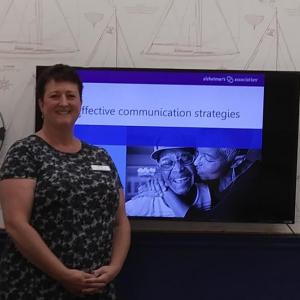Communicating with those who have Alzheimer’s disease
Caring for those with Alzheimer’s disease and other forms of dementia is a long, arduous journey. On July 29, the Community Center sponsored a talk by Cathy Morse of Spectrum Generations to help current and future caregivers with their work.
Morse, the family caregiver specialist for Spectrum, shared a wealth of experience and information that helped listeners understand how to communicate with someone suffering from Alzheimer’s, or as Morse said, “Their person.”
Central to her talk was the information that as the disease progresses, the person loses the ability to understand language. It’s important that the caregiver finds other ways to communicate with the person.
She took listeners through three stages of the disease — early, middle and late — and explained the symptoms. Morse said that typically, the first sign is that the person has difficulty with finances. Bills may go unpaid or the same bill may be paid more than once. Over time, the person can’t compensate for the loss of their ability and may even withdraw from social situations because they can’t follow the conversation.
In the middle stage, the person’s difficulty in “tracking and decoding” what is being said shows the caregiver what portion of the brain is affected, according to Morse. She referred to a “continuous mourning process” as the person loses their abilities.
“Laughter is huge,” she advised her audience. “It lightens the soul.” She encouraged caregivers to give themselves permission to be angry and to be sad. Above all, she explained, it’s important to be honest with the person suffering from Alzheimer’s.
Morse suggested caregivers use short sentences, speak slowly and make sure questions can be answered with a simple response. Labeling photos for the person can be helpful; so can offering prompts to help them make decisions.
There were some things Morse cautioned against. For example, never ask someone with dementia if they remember a certain event or person. And anyone speaking about the patient when he or she is in the room should address the patient, not the caregiver.
Morse reminded attendees that all five senses can be involved in communicating with a person suffering from dementia. Once the ability to process language has gone, there are still bright colors and favorite music and smells.
Brushing the patient’s hair or putting lotion on their hands can help them feel content and involved.
According to Morse, the part of the brain that connects to music is the last thing to go in those with dementia.
Above all, “Self care is crucial,” Morse said. “Reach out for help and don’t go it by yourself. And continue to have that relationship with your person. Cherish it.”
According to Spectrum Generations, 28,000 people in Maine have Alzheimer’s disease. The Alzheimer’s Association maintains a 24-hour, seven-days-per-week hotline at 1-800-272-3900. Someone who can offer advice over the phone is available around the clock.
The non-profit Community Center relies on donations to offer its programs and services. To make a tax-deductible contribution, checks can be mailed to the Community Center at P.O. Box 335, Boothbay Harbor, ME 04538.
Cash donations can be brought to the Community Center at the Meadow Mall between 10 a.m. and 2 p.m. Monday through Friday. To use a credit card to donate, call 633-9876 or visit https://www.boothbaycommunitycenter.org/ and select “Donate Now.”
Event Date
Address
United States

























